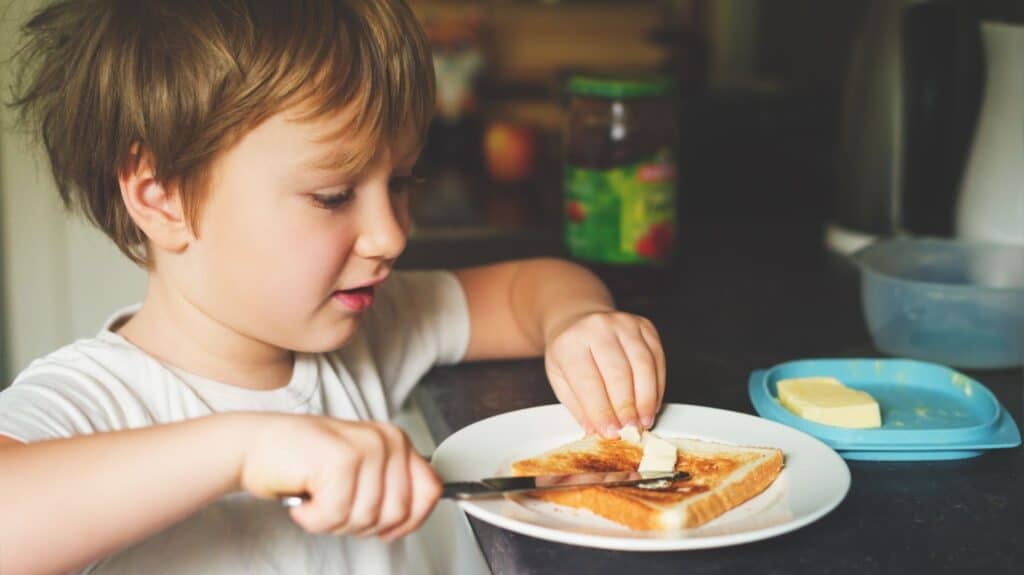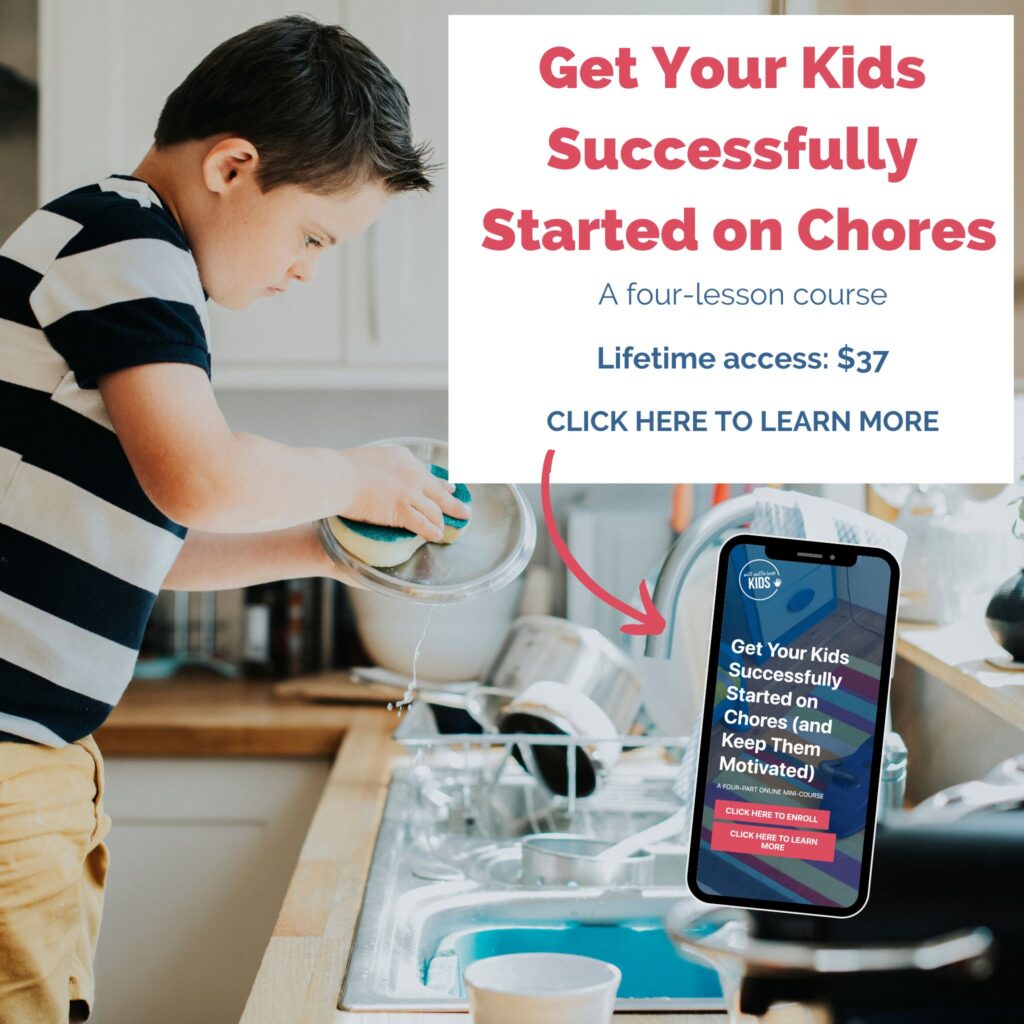8 Ways to Raise an Independent Child While Still Maintaining a Strong Bond
Raising an independent child not only defies conventional parenting advice, it also leads to a more peaceful and positive parent-child relationship.

** As an Amazon Associate I earn from qualifying purchases. **
Ask parents what character traits they’d most like to see in their kids and independence and responsibility top the list.
But what most parents don’t realize is that to raise kids with these qualities, they need to defy conventional parenting advice.
Forcing kids to obey, punishing them for bad behavior, and pushing them outside of their comfort zone (as opposed to encouraging them) make them insecure, timid, and unable to think for themselves.
Somewhat counterintuitively, kids are more likely to become independent in an environment where they are supported, heard, and allowed to express and be themselves as much as possible.
These parenting techniques also often lead kids toward better behavior and a closer, more peaceful parent/child bond.
Here are eight specific ways to raise independent kids:
Form a strong attachment
Many parents assume the way to cultivate an independent mindset in childhood is to make their children handle challenging situations independently. And at first, this seems completely logical.
After all, wouldn’t a child who’s forced to act independently without their parents’ help demonstrate more self-reliance? And wouldn’t the opposite also be true – that a child who is too attached to their parent, becomes too reliant on that parent?
In fact, research shows that the opposite is true.
Because children are immature and vulnerable, they seek security to build their confidence. And no one provides greater security to a child than a parent or caregiver.
If these important adults push kids into situations that are stressful and scary – especially with no acknowledgment of the child’s fears or concerns – these kids can wind up feeling insecure and therefore less inclined to act independently.
But for children who have a secure, loving, and supportive relationship with their parents the opposite is true. When kids know that their parents will respectfully support and nurture them, it builds their confidence and, in time, enables them to demonstrate greater independence.
See related:
Attachment is The Key to Raising More Emotionally Stable Children
9 Ways Children Benefit From Secure Attachment
A Gentle Approach to Handling Separation Anxiety in Children
Allow kids to have feelings and then emotion-coach them
Often parents assume that allowing their children to express strong emotions like anger, fear or disappointment will lead to them being undisciplined and impulsive. And to avoid this outcome, parents either punish their child for feeling that emotion or tell them to stop expressing it.
While emotion regulation is essential for demonstrating confidence and independence, kids will never learn regulation by being punished or told to suppress emotions.
In truth, all feelings and emotions are natural. There’s nothing wrong with being angry that a brother snagged a toy, for example, or feeling disappointed for not being able to have a cookie after lunch.
What’s not acceptable – and what kids need respectful coaching on – are the behaviors that sometimes follow these strong emotions. It’s unacceptable for a child to hit their brother over the snatched toy or to purposefully pour milk on the kitchen floor in protest for not being given a cookie.
Taking time to emotion-coach kids and thus promote emotion regulation allows children to increasingly function in the world independently of us. And it provides them with the tools they need to maintain healthy and secure relationships now and in the future.
See related:
How to Hold Space for Your Child’s Impulses and Emotions
Let kids speak out
Conventional parenting advice suggests that kids should never talk out of line or counter their parents’ wishes, desires, or opinions.
But similar to allowing all feelings, kids also need the opportunity to express their opinions and speak out, as a means of learning to think for themselves. And the home is the best place to practice this.
While allowing rude or disrespectful back talk go unchecked doesn’t help kids either, parents can coach kids on respectfully voicing their thoughts and feelings. For example, if a child yells to get their point across, a parent can respectfully state: “I want to hear what you have to say, but as a rule, I don’t listen to people who yell at me. I’ll wait until you can express your opinion in a calm voice.”
Suppressing kids’ opinions or punishing them for disagreeing only sends the message that their thoughts and opinions are unworthy – the opposite mindset of a confident, independent person.
See related:
Why Every Kids Should Talk Back to Their Parents
Why Your Child’s Most Annoying Habit is Their Best Chance at Success
Provide consistent boundaries and positive discipline
Often parents believe that to raise well-adjusted kids, they must teach them to obey.
And while our children need to learn proper behavior, kids who are taught simply to obey aren’t allowed to learn new skills that encourage self-reliant thinking.
Research consistently shows that kids learn discipline best through positive means, or rather, discipline that’s both kind and firm, as opposed to dictatorial.
When parents validate their child’s feelings and opinions and show empathy, while at the same time upholding rules and boundaries, kids feel greater security and self-confidence. And they’re more likely to absorb the lessons parents want them to learn.
Create a collaborative relationship based on problem-solving
As kids mature and begin to think for themselves, parents can strive to form a collaborative relationship with them with a focus on problem-solving.
This collaborative relationship, as Ross Greene, author of the book, Raising Human Beings, explains, consists of the parent first listening to and gathering information from the child when misbehavior occurs. It continues by encouraging and supporting the child to come up with solutions to the problem at hand.
Not only does this strategy more successfully teach children, it also results in a more peaceful and healthier parent child relationship.
And it encourages a problem-solving mindset in children, a major building block to becoming an independent thinker in adulthood.
See related:
How Teaching Kids Problem-Solving Skills Benefits Them and Makes Parenting Easier for You
Offer kids choices
Most parents know that a great way to diffuse defiance from a toddler is to offer them a choice.
“I know you don’t want to go to the grocery store right now, but we need to buy groceries. Do you want to bring your stuffed giraffe or elephant with you in the car?”
By acknowledging the child’s feelings and giving them a choice, it gives kids a small sense of control, even if they don’t get exactly what they want.
This parenting technique provides other benefits as well. It communicates to kids that they’re significant enough to be able to make choices – certainly a quality of an independent mindset.
School-age children and adolescents appreciate parents asking what they prefer as well. The more we can turn any situation into one where a child can harmlessly make a decision, the more they’ll continue to grow into a confident, self-reliant mindset.
See related:
Do You Let Your Children Make Their Own Choices? This is Why It’s Important
Encourage responsibility
Responsibility and independence go hand in hand. The more responsible our kids can act, the less reliant they will be on us.
Parents can begin encouraging a helping mindset at a young age, as early as age two, by getting them involved in household chores and small tasks. Toddlers are natural and eager helpers and the more we cultivate a helping mindset in them early, the more natural this mindset will feel as they mature.
Getting kids started on chores is another surefire way to build a sense of responsibility in kids. For example, kids of all ages can help with some portion of doing laundry, cleaning and putting away dishes, or putting together their own lunch.
See related:
Age-Appropriate Chores for Kids – Lists by Developmental Stages
7 Tips to Begin Toddler Chores Successfully
How to Get Toddlers and Kids to Pick up Toys
Interested in getting your kids started on chores? My four-lesson course will teach you how to get started, avoid nagging & power struggles, and keep your kids motivated. Click here or the image below to learn more.

Let them learn from natural consequences
Parents often falsely believe that for their child to learn a lesson, the parent must impose a consequence.
But the truth is kids – and especially during adolescence – will learn more by simply experiencing the natural consequences of their actions.
Examples of this include: forgetting homework at home, failing to pack an umbrella on a rainy day, leaving a scooter outside in the rain, and having to replace it with their own money.
Experiencing natural consequences can be a great teacher but keep in mind that young children aren’t mature enough to connect their actions to negative results until they’re six years old.
See related:
Why We Need to Let Our Kids Experience the Natural Consequences of Their Actions
Letting go while still supporting
As our kids mature, they’ll gradually have more opportunities to demonstrate independence – in how they act, where they go, which choices they make, and what they say.
As parents wanting to support that independence, we need to walk a delicate dance of supporting our kids while incrementally letting go.
Beginning at an early age, our children need us to be their rock and foundation – a support they know they can rely on, and a place they can turn to for acceptance, guidance, and most of all unconditional love.
Having that assurance gives our children the confidence they need to increasingly spread their wings and become independent, self-sufficient adults.
What to do next…
1. Subscribe to Self-Sufficient Kids’ email list.
Like what you read here and want to learn more? Every Thursday I’ll send you one parenting tip about raising self-sufficient kids and creating the peaceful relationship you yearn to have with your child. Click here to sign up.
2. Take one of my quizzes!
Find out if you’re raising a self-sufficient kid (click here) or if you’re doing too much for your kids (click here). At the end of each quiz, you’ll be asked to provide your email address to see the results.
3. Get your kids started on chores.
Learn how to get your child started on chores (& keep them motivated + avoid power struggles) by enrolling in my Get Your Kids Successfully Started on Chores course. Click here to learn more and sign up.

About Kerry Flatley
Hi! I’m Kerry, the mother of two girls and a certified parent educator. I believe it is possible for parents to have a supportive, loving, and warm relationship with their kids while raising them to be independent and ultimately self-sufficient. Over the years, I’ve read numerous books and articles that support this belief and I’ve put these ideas into practice with my own kids. Read more about me and Self-Sufficient Kids here.

